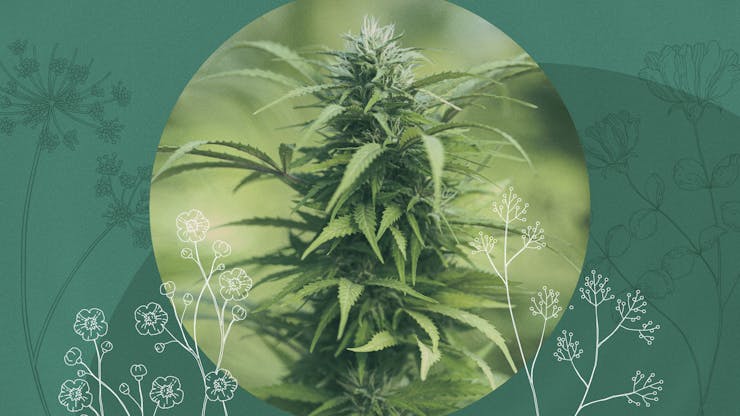Companion planting is the practice of growing plants together that enhance growth and protect each other from pests. It creates a habitat for beneficial insects and can feed the soil.
It’s a chemical-free way to battle pests that can happen in any garden. This is especially important in plants we are going to consume, like cannabis, tomatoes, etc. Essentially we are growing a natural, pest repellent garden.
Fun fact: Many of the pest repellent products on the market contain the terpenes of plants we grow in the garden.
Companion planting is also a great way to attract helpful insects to your grow, which naturally deter pests. The beneficial insects attracted often feast on pests like aphids, spider mites and other unwanted visitors in your weed garden.
Companion planting can be practiced in both your indoor and outdoor weed garden.
Herbs for companion planting
Herbs are fragrant plants we use to season our food. It is no surprise that many herbs are beneficial to grow in the garden. They will attract or deter pests, depending on the aroma of each plant.
Dill
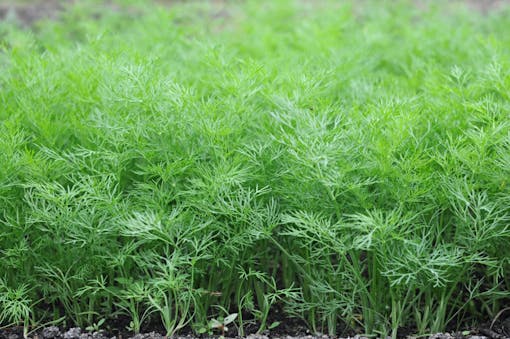
Dill repels aphids and spider mites from neighbouring plants. It acts as an attractant to aphids, deterring them away from your weed.
It attracts beneficial visitors such as butterflies, ladybugs, bees and caterpillars to the garden. Many of these beneficial visitors will eat the aphids and mites further reducing their numbers.
Dill is a hearty herb that is directly seeded into the garden once the chance of frost has passed. Harvest the fern leaf part of the dill throughout the entire season. It can be dried or frozen to be used in dishes year-round.
Fun fact: The flowers are an ingredient in making dill pickles.
Near the end of the season, the flower heads will create seeds. Collect the flavourful seed to use in cooking and be sure to hold onto some for next year’s garden (though some seeds will fall to the ground and regrow in spring naturally).
Parsley
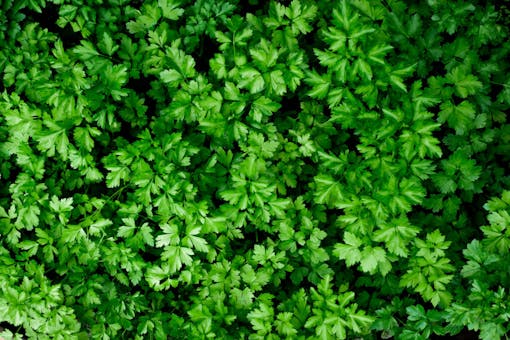
Parsley is a great garden companion that encourages the healthy growth of plants nearby. The herb attracts ladybugs, parasitic wasps and hoverflies to the garden. Hoverflies lay their eggs in the plants then the hoverfly larva eats aphids and thrips.
Ladybugs have long been used in the fight against aphids, always an important bug to attract to the garden. They can also be purchased online to be released in your indoor weed garden.
Parsley also attracts pollinators to the garden. Swallowtail butterflies lay their eggs on the leaves in the garden. This assures butterfly activity and helps maintain a healthy garden.
Pinch off leaves to harvest throughout the season. Dry the leaves then crumble and store in the spice cabinet. Use as a mild multi-purpose seasoning.
Cilantro
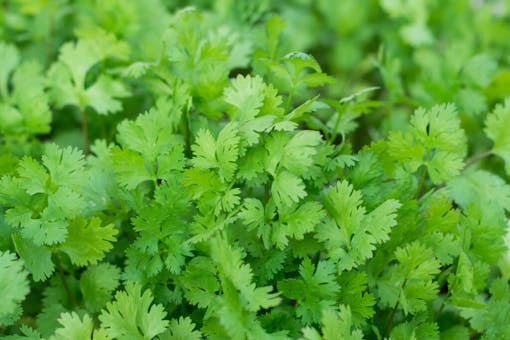
Cilantro has a strong aroma which attracts beneficial insects to the garden, such as hoverflies and parasitic wasps. Attracting beneficial insects to the garden is an effective way to keep aphids, mites and scale in check.
Cilantro is a nitrogen fixer which means it naturally adds nitrogen into the soil, which is particularly useful alongside cannabis. You can even do several small plantings of cilantro throughout the garden to help with soil health.
Start seeds indoors before your last frost or seed them directly into the garden. It is a good choice for containers and in-ground gardens.
Harvest the fragrant leaves often, and enjoy fresh or dried.
The role of “nitrogen fixers” in cannabis gardens
Plants that pull nitrogen into the soil are called nitrogen fixers.
Growing these types of plants improves the soil in the garden. Beans, peas, yarrow and cilantro are examples of nitrogen fixers, which play an important building healthy, nutrient-rich soil.
Cannabis requires nutrients like nitrogen for strong healthy growth and will benefit from this type of gardening. Much like growing good genetics, the soil you grow plants in plays an important role.
Chives
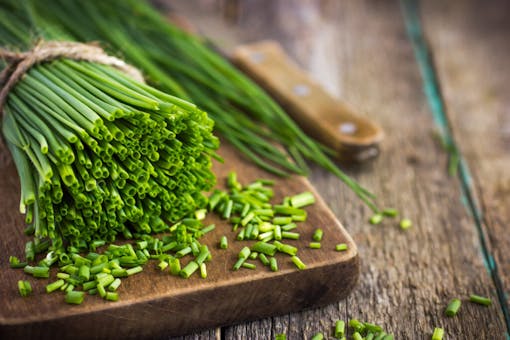
Chives are easy to grow, delicious and natural oils act as a repellent to numerous pests. The anti-bacterial and anti-fungal properties help prevent fungal diseases in the soil.
The flowers attract pollinators like butterflies and bees into the garden. Pollination is not required for cannabis flowers but is important to other plants in your garden, and surrounding area, for a healthy bee population.
Anytime we can attract bees to our gardens it creates a stronger ecosystem and helps save the lives of pollinator species.
Chives can be easily started from seed or by buying started plants from the greenhouse or garden center. If possible select a permanent location in the outdoor garden.
Chives are a perennial plant and will come back year after year. They will slowly spread and do best when planted in the ground. Harvest chives and their flowers throughout the season to enjoy fresh or dried.
Flowers for companion planting
Growing flowers is a good idea for any garden. They promote healthy gardens by attracting beneficial insects, acting as a deterrent for unwanted pests, promoting pollination and bringing amazing colour to your space.
Pro tip: If you are looking to conceal your cannabis plants, consider growing tall types of sunflower.
Chrysanthemums
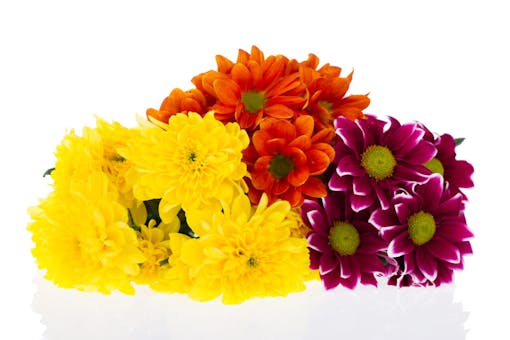
Chrysanthemums contain pyrethrin, an ingredient found in many pest control products on the market. Some species of mums produce a natural chemical that kills soil nematodes. The plants attract parasitic wasps and butterflies to the garden.
These hardy flowers deter ticks and attract mites, aphids, and thrips away from cannabis plants.
They prefer dried soil, so be sure to not overwater. Deadhead the flowers throughout the season to encourage continual blooms. They will continue to flower right through until the arrival of frost.
Start seed indoors, direct seed into the garden, or purchase seedlings from the greenhouse. Chrysanthemums are also a good option for container gardening for indoor growing.
Nasturtiums

These hardy plants are very effective for trapping aphids. They’ll help keep aphids away from the weed that is growing in the garden. In turn, the aphids will attract ladybugs.
Nasturtium flowers are edible and make a beautiful addition to salads.
Start seeds indoors before your final frost or direct seed into the garden. Keep moist to aid in germination. Nasturtiums like full to partial sun and do well both in containers and in-ground plantings.
Cosmos
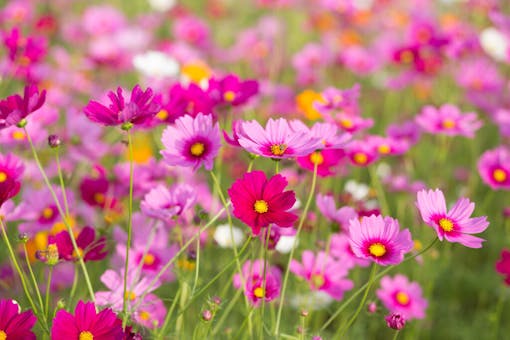
Cosmos attract beneficial insects, including green lacewings which feast on aphids, thrips and scale. The flowers can grow quite tall which is great if you are trying to conceal your weed.
Cosmos do well in dryer soil, which is particularly useful in hot growing zones. Start the plants from seed directly seeded into the garden and keep moist for the best germination. These flowers also grow great in containers if your weed garden is indoors.
Yarrow
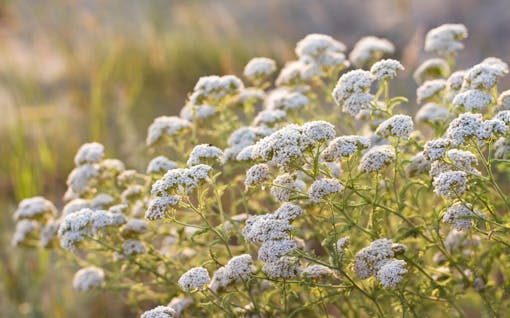
Yarrow attracts bees, hoverflies, ladybugs and predatory insects that eat aphids. They add nutrients back into the soil and improve drainage.
You can start yarrow from seed six weeks before your last frost. Start in the same potting soil you use to start your cannabis plants in, they require the same care as any indoor started weed.
Once plants are established they are incredibly hardy and do well in all growing areas.
Planning Ahead For Success
With a combination of herbs and flowers, we can create a garden that is chemical-free, grows great weed, and contributes to the local ecosystem. Companion plants within a home garden will assist with reducing pests for healthier cannabis plants. As with growing any plants, planning is essential. Select companion plants ahead of time to assure you will be ready with everything you need to have a beautiful garden.
